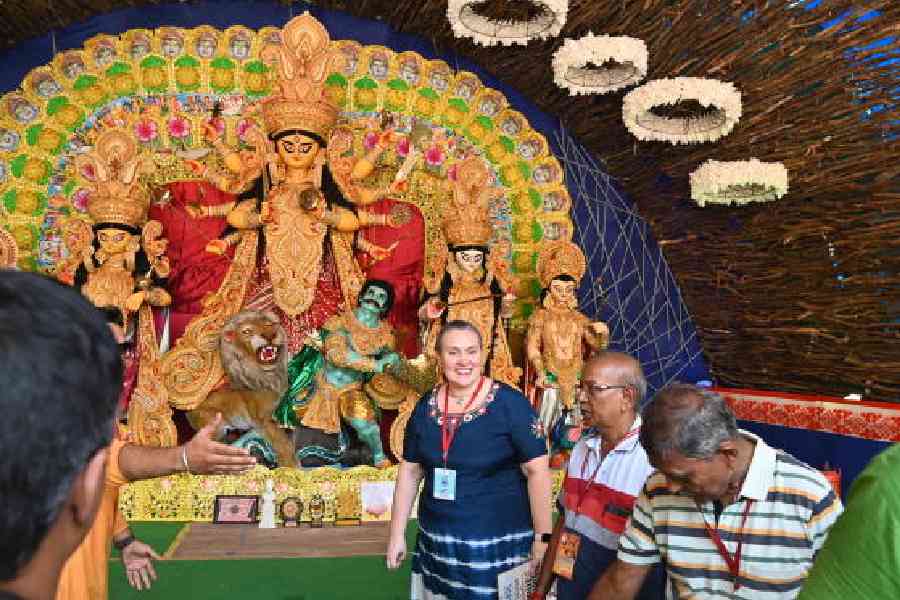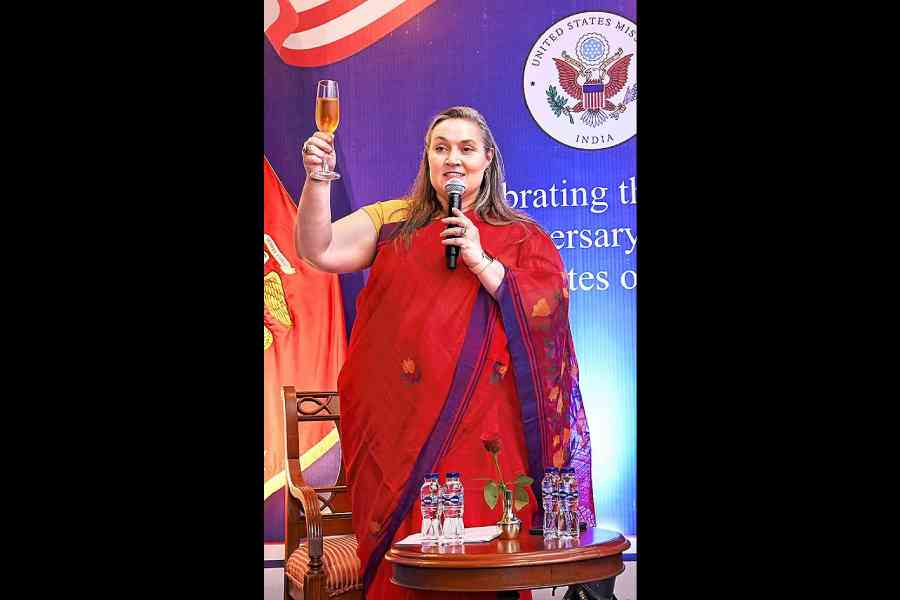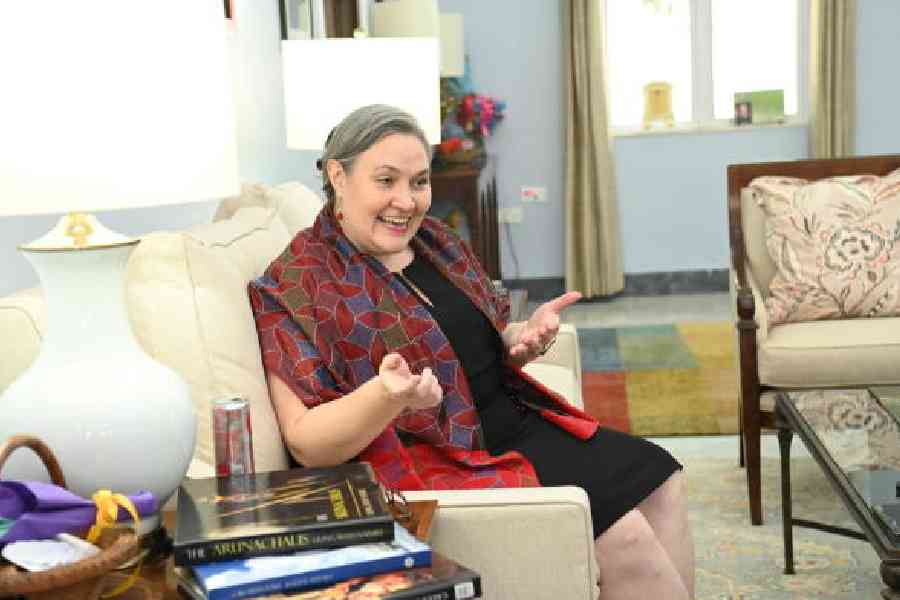Melinda Pavek is not packing her bags just yet but she is into the last lap of her tenure. On the International Day of Women in Diplomacy, the amiable and affable US consul general met t2 at her official residence.
When do you leave? We are not saying goodbye yet, are we?
No, no. We’re saying Happy International Day of Women in Diplomacy (June 24). I leave in early August. But the last month is always chaos with all kinds of things that have to be finished so I thought it would be good to have some conversations a little bit ahead of time.
You have also started getting invited to farewell parties.
Yeah, people are so kind. When I got here (in 2021), people were ready to start socialising again after being locked down. There was a natural warmth that might have been different than in the past. I think that made a big difference in the three years that I had. I feel sorry for my predecessor Patti (Hoffman) because she really only had just about a year of the warmth of Calcutta before the lockdown. She still said that this was one of her best jobs in the foreign service. That says a lot about how wonderful Calcutta is as a place to work in for a US consul general.
When you arrived in the middle of the pandemic, what were the challenges?
I got here in August. Things were looking up a bit. In October, there was Durga Puja, but it was somewhat restrained. My first event was the Indian Independence Day. We had the parade and the event at the governor’s house where there was a small group of people. Then by December, we had the Omicron wave. Everybody had planned events for the Christmas-New Year holidays and everything started getting cancelled because case numbers were rising. Thankfully, that wasn’t a deadly variant though very contagious. That meant you had to be really flexible if you planned events and make sure that you or others were testing, that you had plenty of social distancing and such.
One of the fallouts of the pandemic every consulate faced was the backlog of visa interviews. How are things now?
Things are so much better. I looked at our wait times today for Calcutta. For B1-B2 visa, the wait time is only about 130 days, which is actually less than it was pre-pandemic. Some of our other consulates and the embassy have a little bit longer wait time. But we’re in a very good position now. We’re also doing a lot of student visas too. Our wait time for student visas is less than that. In 2022, we were at about a 1,000-day wait, by April 2023 we had cut that in half and now in June of 2024, we’re down to about 125-130 days. So we’ve made significant progress.
How did you manage to cut the backlog?
It’s not only about doing more interviews, it’s also about expanding the way we do things. The interview waiver process allows people who had a visa that expired in the last four years to process their paperwork without being interviewed if they were in the age range where we had already captured their fingerprints. We opened the consulate in Hyderabad and that has a huge staff. As that gets more and more online, we’re able to do even more interviews. We had a record number of visas processed last year, almost 1.3 million across India. This year we’re on track to have similar numbers as well. So India definitely did not lose its interest in going to the United States during the pandemic. (Smiles) In fact, it has surged.
Are you getting more visa applications now than before the pandemic?
Oh yeah, definitely more. Last year, the number that we processed, 1.3 million, was a record for us.
Travel operators are calling it revenge tourism and the business community too wants to recover lost time.
Yeah. One thing we hear from a lot of people is: “I want to travel next month or the month after that.” It does take a bit of planning. Except for very specific emergency as expediting reason, for which you will find a list on our website, you are unlikely to get an appointment next week or the week after unless you’re very, very lucky. Sometimes recent dates are there only because people shift around or cancel. However, if we keep moving forward the way we have, I think we’ll soon get down to even less wait time.
What other challenges did you face during your tenure here?
There is so much interest in the US-India relationship that I could be three people and still not be at all of the events that I’m invited to! So I think that’s one of the biggest challenges I’ve faced — figuring out how to do everything. You have to look at what’s strategic, what’s important and then figure out how you fit that all into 24 hours. I’m also an introvert, so I need some downtime in order to rebuild my energy level. There’s so much love for the US-India relationship that being able to respond to that love and be everywhere is challenging!
You had family over recently...

Melinda Pavek at a puja in Howrah as a judge for CESC The Telegraph True Spirit Puja in 2023
Yes, my partner (Brandon Dorsey) is here now. My parents were here and my friend Gail (Brinkmeier) was here. My sister and her family visited last year. We’ve had so much fun!
Where did you take them to?
My sister and her family, who came in May of 2023, are outdoors people. So, we did an overnight in the Sunderbans. We also did a bunch of the walking tours. We had kathi rolls... .
From Nizam’s?
Yes, that and about three or four different places. I took Brandon to Kusum’s the other night. Some of the things we did involved my niece and nephew getting to meet some kids and spending time in the pool etc. With my parents, we went to the Taj Mahal and we did a day tour in Delhi. And once they were here, we did some walks in the neighbourhood, I took them to high tea at the Glenburn Penthouse. And we just drove around. Our community liaison office organised the visit for our team to Raj Bhavan and my parents accompanied us. It was a nice tour of the gardens and some parts of Raj Bhavan itself, and we had a nice conversation with the governor. I had intended to travel a bit more with my parents. Unfortunately, my mom broke her arm just before they came.
My partner has been going to a lot of the evening events with me. He’s made a couple of what I call his bromance buddies and he’s been going out while I work. I wish more people had come earlier. But what always happens is that people are like “Oh, you’re leaving in August? I will get there as soon as I can.”
Your earlier posting in Japan gave you karaoke singing. Is there anything in Calcutta that you imbibed that you would remember the city for?
One thing I’ve learned here is the art of the adda and the art of storytelling. I am always impressed that the public speakers here do not talk from talking points. They talk from their personal experience, about things based on stories and that is so much more effective. It really connects you with your audience in ways that formal speeches don’t. So I’ve learned to open up, bring my own experience to whatever it is I speak on. Also everyone speaks about not only their personal experience but historical perspectives. That way history continues to live on in family traditions and aural traditions.
What would be the things that you’d want changed in Calcutta or Calcuttans can do better?
As we think about climate change, we need to think about greater sustainability. I have so many wonderful mementos but a lot of those would be more meaningful if they had a lower impact on sustainability. I really love the way some organisations have started doing saplings or things that are made of natural fibres or reflective of cultural traditions rather than sort of plaques. It’s a sign of respect and affection, which is wonderful, but then, we need to think about the resources we’re using from our planet, what can we do to lighten the resource usage without undermining our culture. There’s so much in Bengali culture that is sustainable, renewable. That could be a focus area to look at.
And there’s always the Bengali way — everything happens at the last minute, sometimes that can be a culture mismatch, you know. (Smiles) It’s hard for us to do things at the last minute.
What are your three favourite haunts in the city?
I love books, as you know, so I have spent a ridiculous amount of time at Oxford Bookstore. My second is the Glenburn Penthouse, because it is such a pleasant place to look over the city and to have wonderful tea. I’m a tea drinker, not a coffee drinker. So it’s an opportunity to have different kinds of tea and know where the tea is coming from and have it prepared. It’s a great place to take guests, friends and family.
My third choice is not one specific place. I just love to walk. I like walking tours with people or on my own. That’s one of the things I really love about the city. No matter where you go, if you walk — you can’t walk and look up, but you can stop and look up and look around. The way that nature and the built city interact and connect with each other and create the stumbling blocks that you can’t....
Calcutta has moveable stumbling blocks who refuse to move.
(Laughs) So true! The city may not be walkable in the way that you might score it, but the fact is you don’t see all of these elements when you’re moving by quickly in a car. You actually have to walk around neighbourhoods and interact with the people who are living and thriving or not thriving and understand what their daily struggles are and just revel in the resilience that you see.
What happens to the saris in your wardrobe?
Some of them I will probably leave for my successor and some I will take with me. I will do my best to use them. My struggle is, of course, I have not successfully managed to wrap myself.
Will your successor be a lady?
Yes. Kathy Giles Diaz — a wonderful person. She and I have known each other since the early ’90s. We both taught English in the same state in Japan. So we’ve known each other even before we joined the foreign service. It’s just a strange and wonderful coincidence that she’s succeeding me. She is originally from Massachusetts, which is where Benjamin Joy, our first consul general (nominated by President George Washington in 1792 to Calcutta), was originally from. In fact, she was serving in Japan when I was trying to get my job in Japan.
So she passed on tips then, and you are doing the same to her now.
Exactly, it’s all about helping each other out.
Any regrets from these three years spent in Calcutta?

Pavek in a sari at an event
My number one regret is that I did not make the time to study Bengali. I started when I first got here and there’s just 24 hours in a day. The second regret is that I didn’t find a yoga instructor early enough and I never really found one consistently. I feel I could have benefited from that in stress management. The other regret is just that this tour is not longer. Three years is too short when you have 11 states that are as diverse and interesting and somewhat challenging to get to. The travel to the Northeast has gotten easier but that’s mainly to the capitals and not the more rural areas. That’s part of the reason why I know that I’ll be back many many times. There’s still so much I want to see and do (in India).
What next? Do you get a home posting?
I am going back to Washington. I will join what we call the Board of Examiners, the group that helps select the next generation of foreign service officers, similar to the Indian Foreign Service. We have a test that helps people get into the service. So I’m looking forward to that.
